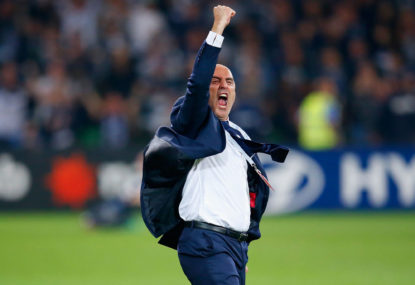It will have taken a few days, perhaps even the entire week, for Melbourne Victory to refocus.
The euphoria of their semi-final triumph over Sydney, an incendiary victory of white-hot footballing drama, will have burned long into the night, searing itself into A-League history in the process.
It capped a weekend of extraordinary finals entertainment, and although the fans are giddily hoping for another jaw-dropping match on Saturday, the two finalists will be preparing soberly and methodically.
Melbourne may as well abandon most of what they did against Sydney; Newcastle are a starkly different team, with an entirely different attacking scheme.
Having prepared to defend in a certain way, against a certain type of approach play, Kevin Muscat’s team will now need to adjust for something very different.
Crucial to their win over Sydney was their harassment of Milos Ninkovic and Adrian Mierzejewski. It’s not hard to see why making life uncomfortable for those two players would make life uncomfortable for Sydney generally; both midfielders rev Sydney’s creative engine. But the way the Sky Blues adjusted – or, indeed, failed to – to this midfield pressure will not be the way Newcastle adjust.
As seen above, in the early stages of that semi-final, Melbourne’s aggressive pressing of both Ninkovic and Mierzejewski was obvious; Sydney passed their way around, waiting for a clear avenue to activate their two stars, with Melbourne poised to pounce on them as soon as they received the ball. They found Ninkovic, and Terry Antonis forced him to retreat, harrying and jockeying him back toward his own goal.
When Josh Brillante received the ball, he had time to survey the scene.
The illustrations on the above clip shows the pass that Newcastle would make in this situation; imagine that Bobo, highlighted at the top, is Roy O’Donovan, and Brillante is Steven Ugarkovic. The striker has crept back onside, but is behind his marker. There is space in behind the defence, with the goalkeeper out of shot. The ball over the top, using O’Donovan’s pace, is the ball Newcastle will play this weekend.
Sydney, with Bobo hardly a speedster, and patient probing more their modus operandi, choose not to play the lofted ball, and Brillante slides a pass out to Luke Wilkshire, resetting the situation and maintaining possession. Newcastle are not concerned with holding onto the ball for long stale periods. If they see an opportunity to apply sudden vertical pressure – even with a low-percentage longer pass – they will take it. In their semi-final, 74 of Newcastle’s 296 passes were long balls, or 25 per cent. Against the Victory, 93 of Sydney’s 642 passes were long balls, or 14 per cent.
Here, Sydney struggled to adapt. You can see the Victory were more than happy to allow Brillante and Brandon O’Neill the freedom to pass out of midfield, as long as Mierzejewski and Ninkovic were being marked out of the play. O’Neill strolled up here, and the Victory midfielders actively backed off, checking over their shoulders for Ninkovic and Mierzejewski.
O’Neill couldn’t find a streaking Ninkovic with a raking angled ball, and even though that pass could have been dangerous had he connected, this was Melbourne’s plan working perfectly; force Ninkovic into becoming a runner – instead of a passer – and a micro-battle has been won. Muscat would much rather have O’Neill making that key pass than Mierzejewski or Ninkovic.
Funnelling their next opponents’ key attackers in this way will not have similarly preferable results.
Dimi Petratos – who, like Ninkovic, operates largely out on the left – is a much more comfortable out by the touchline, off the ball, working as a receiver rather than a passer. His heatmap against Melbourne City indicates as much, and Stefan Nigro, the injury-forced change at right-back, will be a weakness that the Jets may aim to test.
But then the danger of Melbourne tracking Petratos too closely, allowing Newcastle’s midfielders to bring the ball up the middle unmolested is obvious; Riley McGree is an excellent ball-carrier, and his goal in that semi-final shows how good he is in advanced areas, even if cloistered in tight attacking quarters.
(Any excuse to show it again, really).
Ugarkovic is no slouch surging through the middle either, as evidenced by this lung-burster 84 minutes into the match. A catch-22, and a problem that Melbourne will have to solve.
Muscat isn’t stupid, and of course he’s aware how different Sydney and Newcastle are. In the final, he’ll expect to have more than the 40 per cent possession he had against Sydney. As a result, he should also expect fewer opportunities to counter-attack.
With this in mind, perhaps Antonis’ attacking skills will need to be utilised more often, rather than restricting him to marking-heavy, defensive-minded brief.
The relatively high defensive line Melbourne played in the semi-final will be feasted upon by the Jets, so that too will have to be tweaked.
Muscat drilled a clear defensive scheme into his team for that semi-final, in preparation for what they thought would be their biggest challenge this season; now that scheme must be washed away and replaced by a totally different one.
Melbourne’s ability not just to formulate a tailored defensive system to deal with Newcastle, but to implement it successfully on the night, will be the key to their grand final chances.





























































































